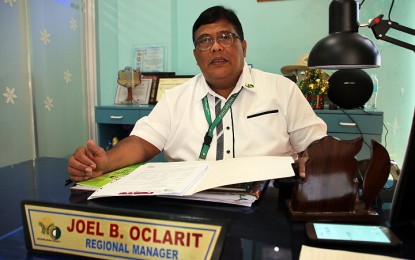
SUPPORT TO COCONUT FARMERS. Joel Oclarit, manager of the Philippine Coconut Authority in Caraga Region, says the agency has a total allocation of PHP105.34 million for 2020 to be used for coconut planting, replanting, and fertilization programs that will benefit about 15,000 coconut farmers. He called on farmers to innovate and adapt to new technologies to augment their income. (PNA photo by Alexander Lopez)
BUTUAN CITY – Coconut farmers in Caraga Region who want expansion or replanting will receive funding from the Philippine Coconut Authority (PCA).
A total allocation of PHP105.3 million will be available for the coconut farmers in Caraga Region for planting and replanting programs, PCA-13 Regional Manager Joel Oclarit told the Philippine News Agency on Monday (February 3).
Oclarit said that aside from planting and replanting programs, a portion of the budget will also be used for the coconut fertilization program in the area.
“The planting and replanting will be undertaken through the Participatory Coconut Planting Project (PCPP) that will encourage coconut farmers to plant more coconut trees in the region,” he said.
Data provided by PCA-13 indicates that Caraga Region has a total land area of 272,093 hectares fully planted with coconut trees covering 1,311 barangays, most in Surigao del Norte and Surigao del Sur.
The region has a total number of 118,069 coconut farmers.
Oclarit said that the PCPP is among the major components of the Accelerated Coconut Planting and Replanting Programs (ACPRP) of PCA that promotes coconut planting in open and suitable areas and replanting of senile and unproductive coconut trees and those damaged by natural calamities.
PCPP, he added, involves the giving of cash incentives to qualified farmer participants for the production, transplanting, and stabilization of good coconut seedlings on their own farms.
PCA-13 is also developing a coconut seed farm project in an 18-hectare land in Barangay Sukailang, Surigao City.
“The seed farm can accommodate more than 2,600 seedlings of dwarf and tall coconut varieties and will be disposed to farmers and planters at a very minimal price,” Oclarit said.
Support
Though coconut farmers were affected by the low price of copra in the previous years, Oclarit said PCA was able to help them through other support programs and services.
“PCA is supporting coconut farmers to innovate and adapt to new technologies especially in manufacturing that is proven to augment incomes,” he added.
Among the support programs of PCA to the coconut farmers include the Community/Household Level Coconut Processing Project (CHLCPP).
In 2018, a total of 95 coconut processing interventions were conducted by PCA-13 throughout the region that include coir fiber processing, coir-based fertilizer, coconut meat-based bread and pastries and ice cream, virgin coconut oil, and coco sugar.
In the same year, a total of 1,440 coconut farmers directly benefited from the CHLCPP in Caraga with a total allocation of PHP12,480,000.
“We have a success story last year where a PHP15-million project for our coconut farmers already provided them with over PHP1 million gross sales during the first month of the year 2020,” Oclarit said.
He is referring to the JAIF-EEA Coir Fiber Processing Project that was released to Bayugan City Coconut Farmers Association (BCCFA) in June last year. JAIF-EEA stands for Japan-ASEAN Integration Fund-Emergency Economic Assistance.
The BCCFA coir processing, with a project cost of PHP15,311,758, has a daily processing capacity of 24,000 husks.
Oclarit said the BCCFA coir processing project started its full operation after the turn-over last year. As of January 31, 2020, the officers and management of the BCCFA coir processing project reported a gross income of PHP1,637,405. (PNA)
